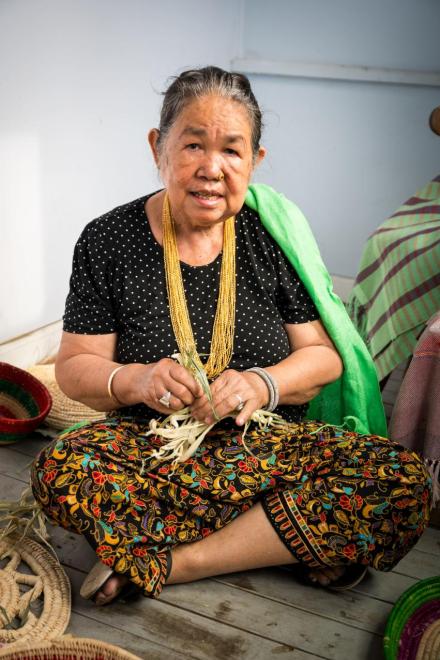
Hungma Subba, now in her 70s, experienced an uncommonly difficult journey as a refugee from Bhutan to over a decade in a refugee camp in Nepal and then on to a challenging resettlement in Worcester, some 10 years ago. As a child, her farming family and that of her husband Bhim (also an artisan) had lived and prospered to a degree in Bhutan for many years. Their forebearers had immigrated to Bhutan decades before from Nepal, in search of more land to till. They spoke Nepalese at home but saw Bhutan as their permanent home. However, in the 1990s the Bhutanese central government took an extreme nationalist and xenophobic turn and designated the Nepali-speaking Bhutanese as “outsiders” and even as non-citizens. This political situation became extremely threatening to this Nepali-speaking community and they were forced to flee Bhutan, leaving everything behind (farm, livestock, home, friends). This is the classic United Nations definition of a refugee: a person who has been forced to flee, across what are often national borders, due to direct threats of violence tied to the refugee’s political, religious, ethnic, or racial identity.
Indeed Hungma and Bhim and several family members fled for their lives to a U.N. sponsored refugee camp over the border in Nepal. They languished there for over a decade, waiting for authorization to resettle in a third country, Eventually they arrived in Central Massachusetts, as official refugees, fully documented. Their grandchildren enrolled in the city’s public schools and their grown children studied English and got paid jobs. Hungma stays at home most days in the family’s triple decker near an interstate highway. Each family unit has a floor. Social isolation of elders is an issue for older refugees in this community, particularly for those too traumatized to summon the energy to study English and too old for access to the standard job market of Massachusetts (which is strongly tilted toward college-graduates, whereas many older refugees never had the opportunity to go to high school, or even primary school).
This whole situation from psychological challenges to economic circumstance makes Hungma’s sprightly craftwork all the more remarkable (Rodgers and Umunna, 2017, Path to Empowerment, pp. 16-17). Most days she sits at a frame loom and weaves intensely colorful 10-inch-wide strips of cloth, which she then folds and fashions into tote bags, which RAW markets for her to the general public. Many days, too, she weaves dried corn husks into circular, decorative but also practical mats called pira. The larger pira can be used as seating mats for family members or honored guests; the smaller ones can be bought as wall decorations. At her loom Hungma prefers to use thread from markets in Nepal in contrast to materials available in Worcester’s sewing stores; Ellen Ferrante and Joan Kariko of RAW have arranged for an unlikely long-distance trade in “the right sort of thread” to please artisans like Hungma. Ellen and Joan also source this artisan’s corn husks from seasonal farm markets around Worcester and from local grocery stores (harder than one might think, as shucking corn in the store aisles is frowned upon).
Hungma and Bhim’s front room was a festive ‘cloth scene’ one time when we were interviewing them soon after we first met in 2017. Hungma and her daughter Som (our English translator that day) knew that we were interested in cloth use in general in this family. So, they forthwith started to pull out stacks of brightly colored sarongs they had been sent by relatives back in Nepal. They wanted us to see how rich their cloth stores really were.
Their front room was also lavishly decorated with crocheted wall hangings and door lintel coverings (called toran). These toran wished visitors to the home good luck and happy lives. Through textiles, the family was Bhutanese-izing their Worcester living quarters. Hungma’s daily costumes also vigorously asserted the same thing: her long swathes of cloth she wrapped herself in, sari-like (canary yellow, deep blue, and striking red cloths) shouted out, ‘Vibrancy! I am a beautiful older woman!’ Hungma is not a meek and mild senior citizen; she is not beaten down nor silenced.

